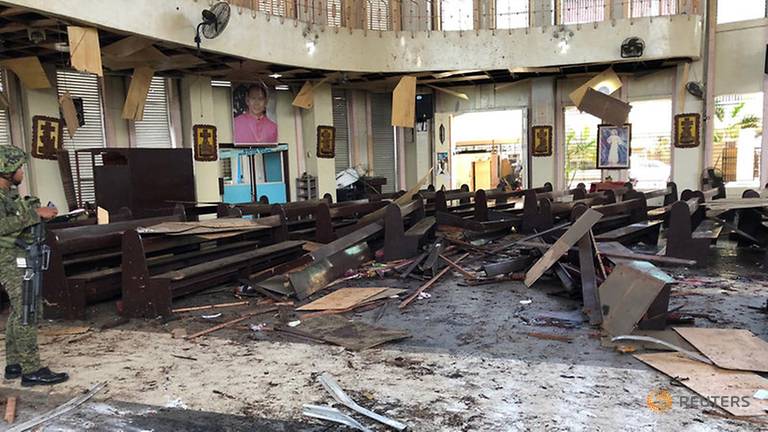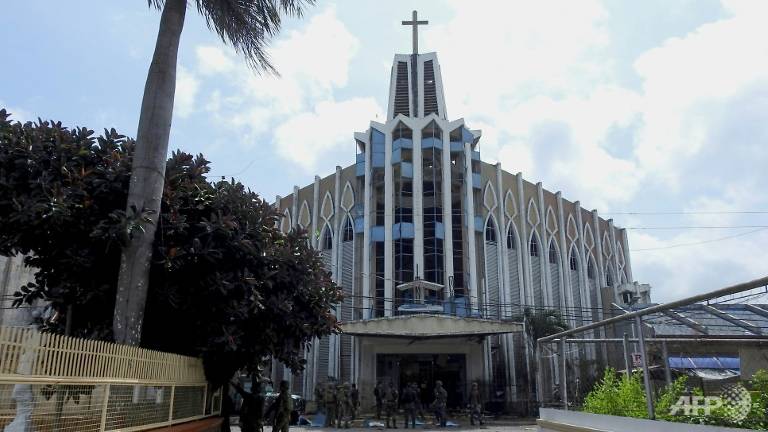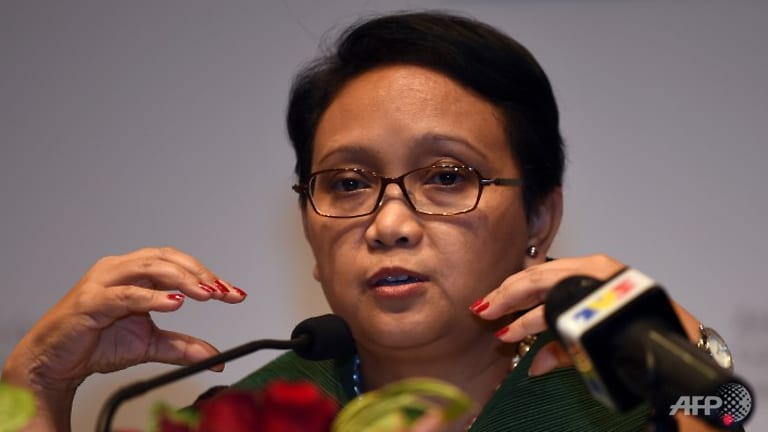Trust and relations between Indonesia and the Philippines have become casualties of the Jolo cathedral bombing, says Sidney Jones, Director of the Institute for Policy Analysis of Conflict in Jakarta.


A Philippine Army member inspects the damage inside a church after a bombing attack in Jolo, Sulu province, Philippines January 27, 2019. (Photo: Armed Forces Of The Philippines - Western Mindanao Command/Handout via REUTERS)
JAKARTA: The Philippine government’s premature declaration that Indonesians were the perpetrators of the Jolo cathedral bombing last month has set back the prospects for regional cooperation on terrorism and reinforced a perception among Indonesian counterparts of the Philippines as an unreliable and unprofessional partner.
The eagerness of senior Philippine politicians to declare the case closed does a disservice to all the younger, well-trained law enforcement and intelligence officers in Manila and Mindanao who are determined to find out who the perpetrators actually were and uncover the sequence of events that led to the attack.
Indonesians may well have been involved, and if they were, the need for proactive information sharing is critical. As the last Islamic State strongholds in the Middle East are falling, the call of Islamic State leaders to their supporters to wage war at home takes on a new significance for Southeast Asia, underscoring the need for cross-border cooperation.
READ: Battered in the Middle East, IS eyes Southeast Asia as next terrorism hotspot
The urgent task now is for donors to use every opportunity to bring Indonesian and Philippine officials together from all agencies at all levels to counteract the distrust caused by irresponsible political statements.
A BLAME GAME?
Hard facts remain scarce. On Sunday (Jan 27) morning, an explosion took place inside the cathedral, followed seconds later by another bombing outside the church as soldiers on duty rushed to the scene.
On Jan 29, President Rodrigo Duterte spoke to reporters and said he learned from intelligence sources that the bombers were a husband-wife team, and while reports were conflicting, they seemed to be Indonesian.
JAKARTA: The Philippine government’s premature declaration that Indonesians were the perpetrators of the Jolo cathedral bombing last month has set back the prospects for regional cooperation on terrorism and reinforced a perception among Indonesian counterparts of the Philippines as an unreliable and unprofessional partner.
The eagerness of senior Philippine politicians to declare the case closed does a disservice to all the younger, well-trained law enforcement and intelligence officers in Manila and Mindanao who are determined to find out who the perpetrators actually were and uncover the sequence of events that led to the attack.
Indonesians may well have been involved, and if they were, the need for proactive information sharing is critical. As the last Islamic State strongholds in the Middle East are falling, the call of Islamic State leaders to their supporters to wage war at home takes on a new significance for Southeast Asia, underscoring the need for cross-border cooperation.
READ: Battered in the Middle East, IS eyes Southeast Asia as next terrorism hotspot
The urgent task now is for donors to use every opportunity to bring Indonesian and Philippine officials together from all agencies at all levels to counteract the distrust caused by irresponsible political statements.
A BLAME GAME?
Hard facts remain scarce. On Sunday (Jan 27) morning, an explosion took place inside the cathedral, followed seconds later by another bombing outside the church as soldiers on duty rushed to the scene.
On Jan 29, President Rodrigo Duterte spoke to reporters and said he learned from intelligence sources that the bombers were a husband-wife team, and while reports were conflicting, they seemed to be Indonesian.
READ: Surabaya bombings and the conundrum of family suicide bombers, a commentary
On Feb 1, Interior Secretary Eduardo Ano identified the suicide bombers as Indonesians, though he did say the information had to be verified.
In a press conference on Feb 4, Philippine National Police Chief Oscar Albayalde announced the “surrender” of five suspects (all Abu Sayyaf members), gave the death toll as 23, one more than most previous accounts, and referred to an Indonesian woman as one of the suicide bombers. Many remain sceptical of the circumstances surrounding the “surrender”.

President Duterte said a woman who remains at large left a device that exploded during mass at the cathedral in the remote Muslim-majority island of Jolo on Sunday, and her husband later blew himself up outside (Photo: AFP/NICKEE BUTLANGAN)
READ: Why the use of women and children raises the stakes in the fight against terrorism, a commentary
There is no hard evidence to identify the bombers: No immigration or travel documents, no fingers to take prints from, no skulls to reconstruct possible facial images, no identification that would make DNA matches possible. To this day, it remains unclear whether the bombs were detonated by the couple themselves or by someone else near the site.
The information that the couple was Indonesian rests on the testimony of witnesses. One who heard them speaking Indonesian and who himself had lived in Indonesia for six months so knew the language, another who had spent several months in the same camp as the male foreigner and testified he was Asian but did not know his nationality.
The camp, led by Abu Sayyaf Group leader Hatib Hajan Sawadjaan, is believed to be hosting a handful of other foreigners, including an Egyptian and two or three minors.
READ: Why the use of women and children raises the stakes in the fight against terrorism, a commentary
There is no hard evidence to identify the bombers: No immigration or travel documents, no fingers to take prints from, no skulls to reconstruct possible facial images, no identification that would make DNA matches possible. To this day, it remains unclear whether the bombs were detonated by the couple themselves or by someone else near the site.
The information that the couple was Indonesian rests on the testimony of witnesses. One who heard them speaking Indonesian and who himself had lived in Indonesia for six months so knew the language, another who had spent several months in the same camp as the male foreigner and testified he was Asian but did not know his nationality.
The camp, led by Abu Sayyaf Group leader Hatib Hajan Sawadjaan, is believed to be hosting a handful of other foreigners, including an Egyptian and two or three minors.
READ: Islamic State brides and the meaning of citizenship, a commentary
LOST EVIDENCE AND BROKEN TRUST
Indonesians were outraged that senior officials would jump to conclusions about the bombers’ nationality based on such skimpy evidence.
Indonesia’s elite counter-terrorism unit, Detachment 88, sent a team to Jolo to see what additional information they could glean, only to find the crime scene in shambles. Families retrieving the dead and wounded, top officials visiting the site with media in tow, dogs eating human remains - all of this meant that key evidence was lost.
The Indonesian ambassador in Manila sent a formal request for clarification to the Philippines foreign secretary while Indonesian Foreign Minister Retno Marsudi stressed that there was no concrete proof that Indonesians were involved.

LOST EVIDENCE AND BROKEN TRUST
Indonesians were outraged that senior officials would jump to conclusions about the bombers’ nationality based on such skimpy evidence.
Indonesia’s elite counter-terrorism unit, Detachment 88, sent a team to Jolo to see what additional information they could glean, only to find the crime scene in shambles. Families retrieving the dead and wounded, top officials visiting the site with media in tow, dogs eating human remains - all of this meant that key evidence was lost.
The Indonesian ambassador in Manila sent a formal request for clarification to the Philippines foreign secretary while Indonesian Foreign Minister Retno Marsudi stressed that there was no concrete proof that Indonesians were involved.

A file photo of Indonesian Foreign Minister Retno Marsudi. (Photo: AFP)
READ: The secret group dynamics that fuel horrifying terror attacks, a commentary
The casualty is the trust that is vital to cooperation on counter-terrorism issues. Some Philippine officials believe that Indonesia is deliberately sending its terrorists to the Philippines to ensure they don’t do damage at home.
Some top Indonesian officials see Philippines as incapable of conducting serious investigations, so why share sensitive information that will get misused?
DONORS CAN HELP BRING THE COUNTRIES TOGETHER
The Jolo bombing has widened the gulf, at a time when there is more of a need than ever to understand the linkages between extremist movements in the two countries. Donors can help.
Now is the time to take whatever budgets governments have for exchanges and bring Indonesians and Filipinos together in the same programmes: Law enforcement, immigration, prison administration and intelligence, to ensure that even if the politicians make a mess of things, the personal ties established can go some way to make up for it.
READ: The secret group dynamics that fuel horrifying terror attacks, a commentary
The casualty is the trust that is vital to cooperation on counter-terrorism issues. Some Philippine officials believe that Indonesia is deliberately sending its terrorists to the Philippines to ensure they don’t do damage at home.
Some top Indonesian officials see Philippines as incapable of conducting serious investigations, so why share sensitive information that will get misused?
DONORS CAN HELP BRING THE COUNTRIES TOGETHER
The Jolo bombing has widened the gulf, at a time when there is more of a need than ever to understand the linkages between extremist movements in the two countries. Donors can help.
Now is the time to take whatever budgets governments have for exchanges and bring Indonesians and Filipinos together in the same programmes: Law enforcement, immigration, prison administration and intelligence, to ensure that even if the politicians make a mess of things, the personal ties established can go some way to make up for it.
[Sidney Jones is the Director of the Institute for Policy Analysis of Conflict, Jakarta. This commentary first appeared on Lowy Institute's blog The Interpreter. Read it here.]
https://www.channelnewsasia.com/news/commentary/southern-philippines-church-bombing-jolo-church-abu-sayyaf-11275454

No comments:
Post a Comment
Note: Only a member of this blog may post a comment.